Aleppo pepper, also known as halaby pepper, is made of deep red, mild chile flakes with a complex flavor – fruity, tangy, and a tiny bit spicy all at once! A dash of our Aleppo-style pepper is all it takes to elevate everything from chicken, fish, and eggs to dips, grilled vegetables, and more! (Check out the ideas below.)
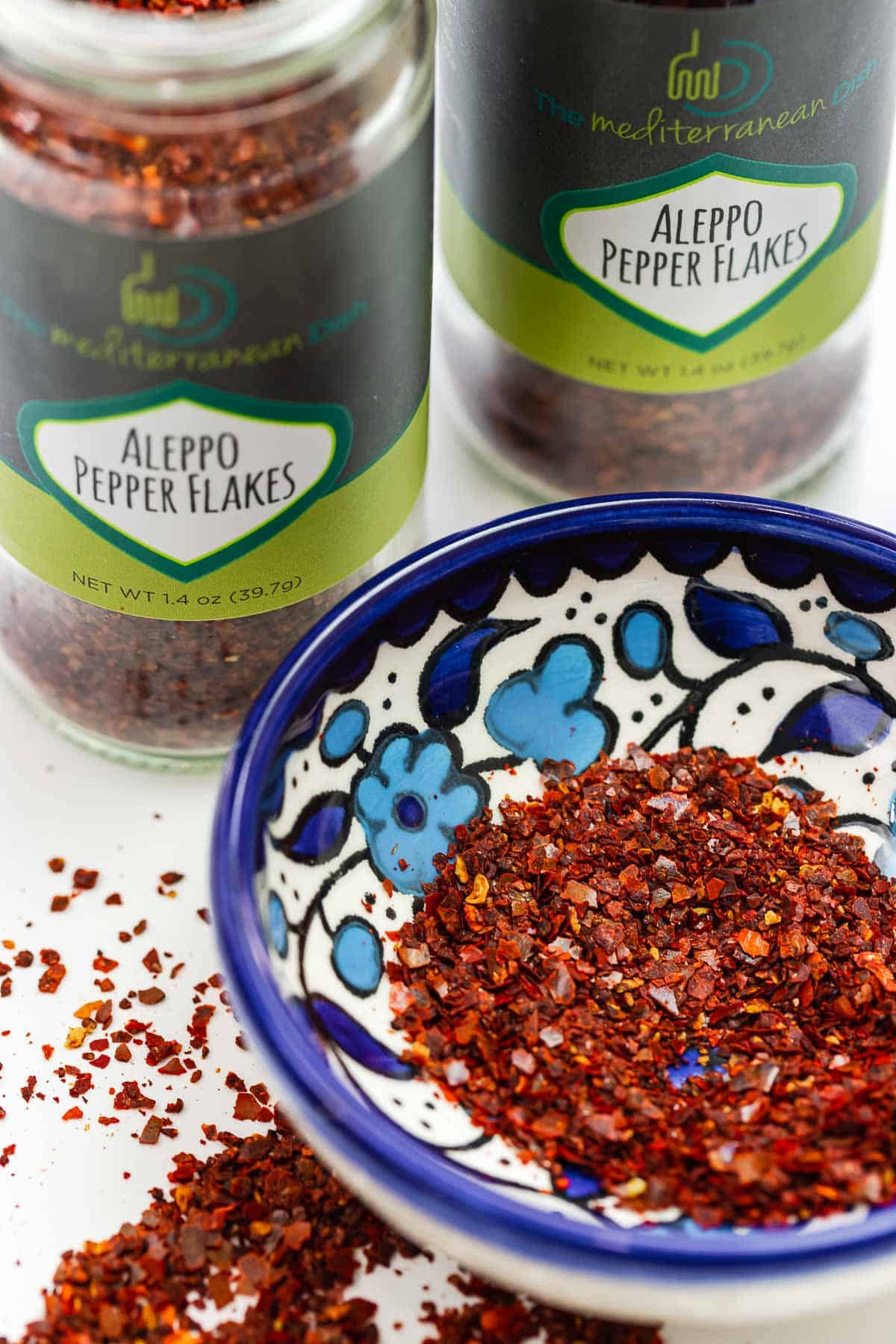
Aleppo pepper is one of the most versatile seasonings in my Mediterranean pantry, and it’s one I reach for almost on a daily basis be it to flavor a marinade for some chicken, to season a summer salad, or even to jazz up snacks like popcorn and grilled watermelon (oh, have you tried that yet?).
Every so often, I get to highlight a special pantry ingredient. Earlier, I wrote a little guide about extra virgin olive oil, and today we dive into everything you need to know about Aleppo pepper. And I promise, once you start using it, you’ll come back for more of the delicious burgundy-hued chile flakes!
In this post
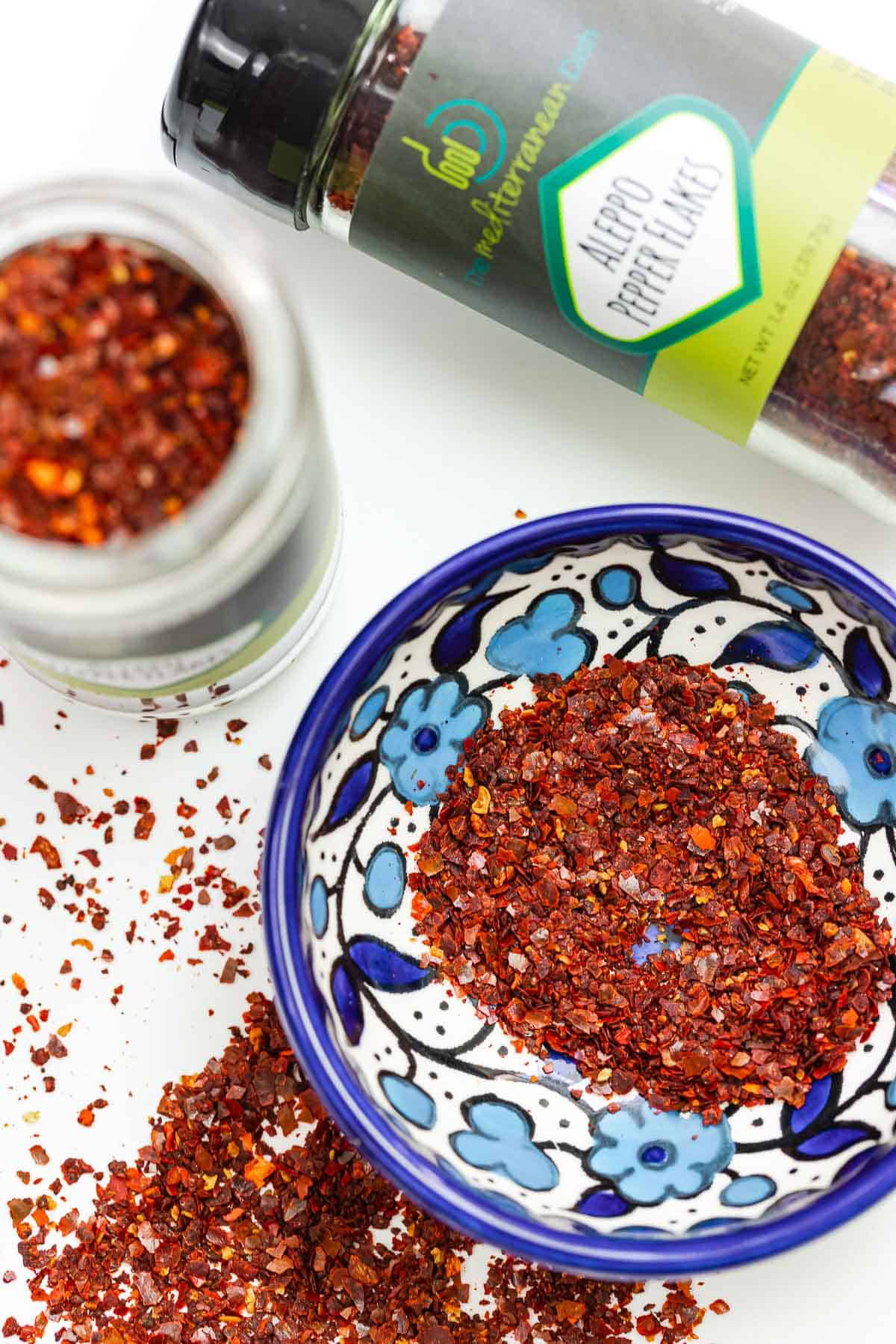
What is Aleppo pepper?
Aleppo pepper is made from deep red Halaby chile peppers, which hail from Syria. Unlike other chile pepper flakes, it is fairly mild, slightly tangy with a fruity finish that is akin to sundried tomatoes. The spice is named for the Syrian city of Aleppo, where the peppers were once grown in abundance. Now, however, the chile peppers are mostly grown in Turkey, some using Syrian seeds.
How are Aleppo pepper flakes made?
Once ripe, the naturally oily peppers are cut lengthwise, de-seeded, and then partly dried in the sun. Then, they’re coarsely ground and mixed with salt and olive oil. Lastly, the pepper flakes are allowed to dry completely before being packaged.
Once processed and packaged, the pepper flakes have a rich, deep red color, very similar to the color of sumac, in fact! The coarse pepper flakes might look a little oily, and this is normal because Halaby peppers are slightly oily, plus they’ve been finished with olive oil.
Where to buy it
You can find my favorite Aleppo pepper flakes via our online shop here. our Aleppo-style pepper is an all-natural seasoning, fresh and bold-flavored, and you’ll love the mild heat and subtle tangy-sweet flavor that gives off hints of raisins or, like I said earlier, sun-dried tomatoes!
Unless you’re lucky enough to find some at a trusted grocer near you where the spices haven’t been sitting on the shelf too long, you’ll want to grab a bottle of our Aleppo-style pepper (or get it with our exotic 6-pack).
How hot or spicy is it?
Aleppo pepper is not the same as red pepper flakes. If you taste a little Aleppo or halaby pepper, you’ll find it mildly spicy–it has a little kick, but it is not at all unbearably hot like other chile peppers. (For reference, it is about half as spicy as other red pepper flakes you have in your spice cabinet.) It’s also slightly sweet and tangy with a pleasant fruity aroma and subtle hints of cumin and vinegar. This makes halaby pepper such a complex spice that is pleasing to most palates, especially since its heat won’t make you tear up.
While other chile peppers such as cayenne are primarily used to add heat, Aleppo-style pepper flakes are more of a flavor enhancer, kind of like salt. It’s the perfect way to add a little something special to your meals.
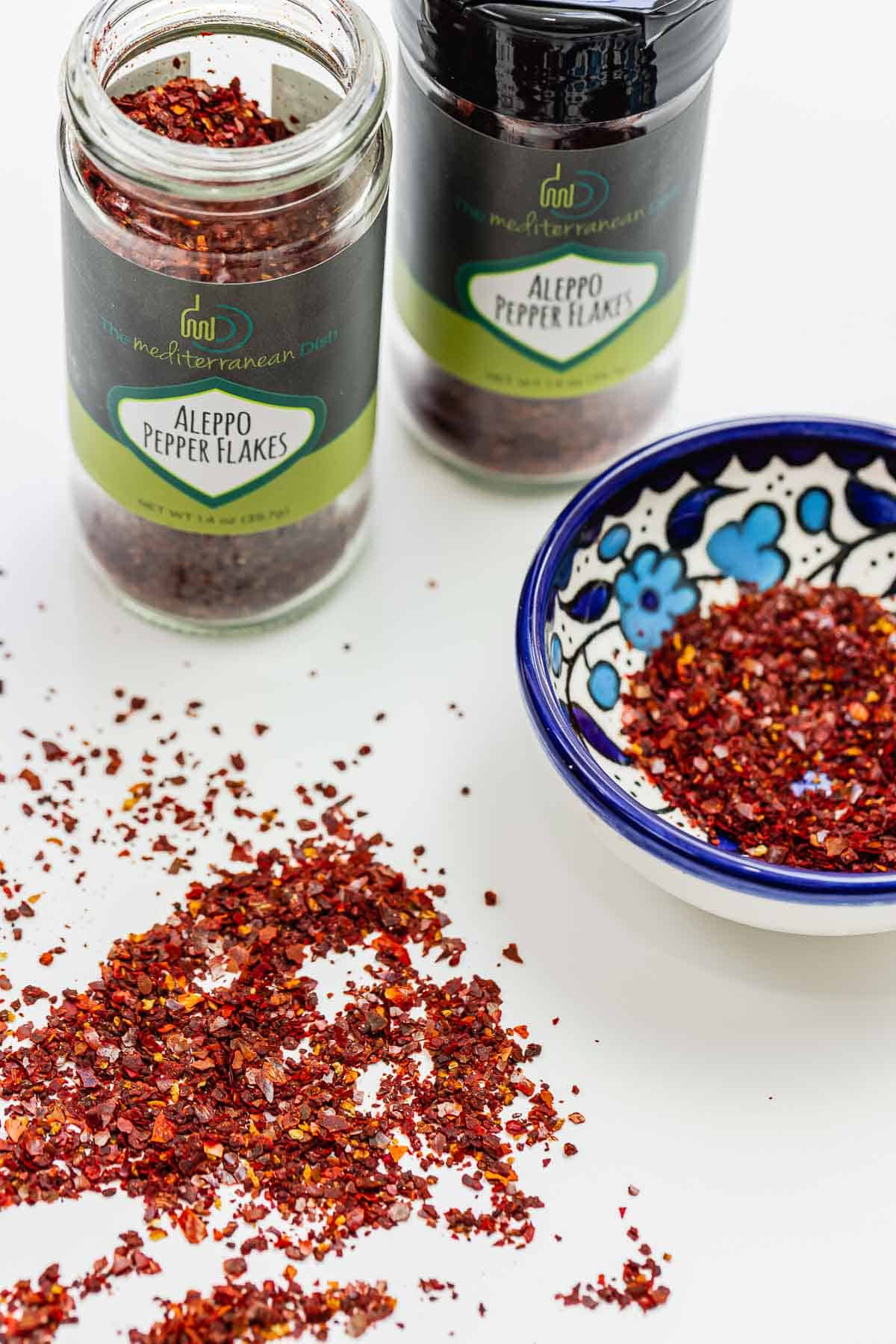
What can I do with Aleppo pepper?
Aleppo chili pepper is one of the most versatile ingredients in my Mediterranean pantry. With its robust, multi-faceted flavor, it brings so much depth!
It adds a nice kick when used to season grilled chicken wings, and it adds color and a slightly zesty, sun-dried tomato type of flavor to marinades. I also love using it as a simple finishing touch on appetizers and dips (especially Muhammara dip – it’s a key ingredient!). Infused with warm olive oil, it’s a stunning drizzle to finish a bowl of creamy garlic soup. Just a pinch adds an effortless “wow” factor!
A few favorite Aleppo pepper recipes to try
When trying out a new spice, it can be confusing to figure out how to use it. So, I put together a short list of a few of my favorite recipes that use Aleppo pepper flakes. But there are loads more on the site, too. Just use the Search function to find more tasty recipes!
Chicken
- Turmeric Lemon Chicken Soup – This soup is a fan-favorite, and with good reason. It’s simply brimming with vegetables, lemony goodness, and flavor from spices like coriander and Aleppo-style pepper.
- Citrus Rosemary Chicken – Crisp, tangy, and succulent citrus rosemary chicken in a tangy marinade loaded with spices.
- Grilled Chicken Wings – Plenty of warm spices in this chicken marinade, like Aleppo-style pepper, nutmeg, and sweet paprika.
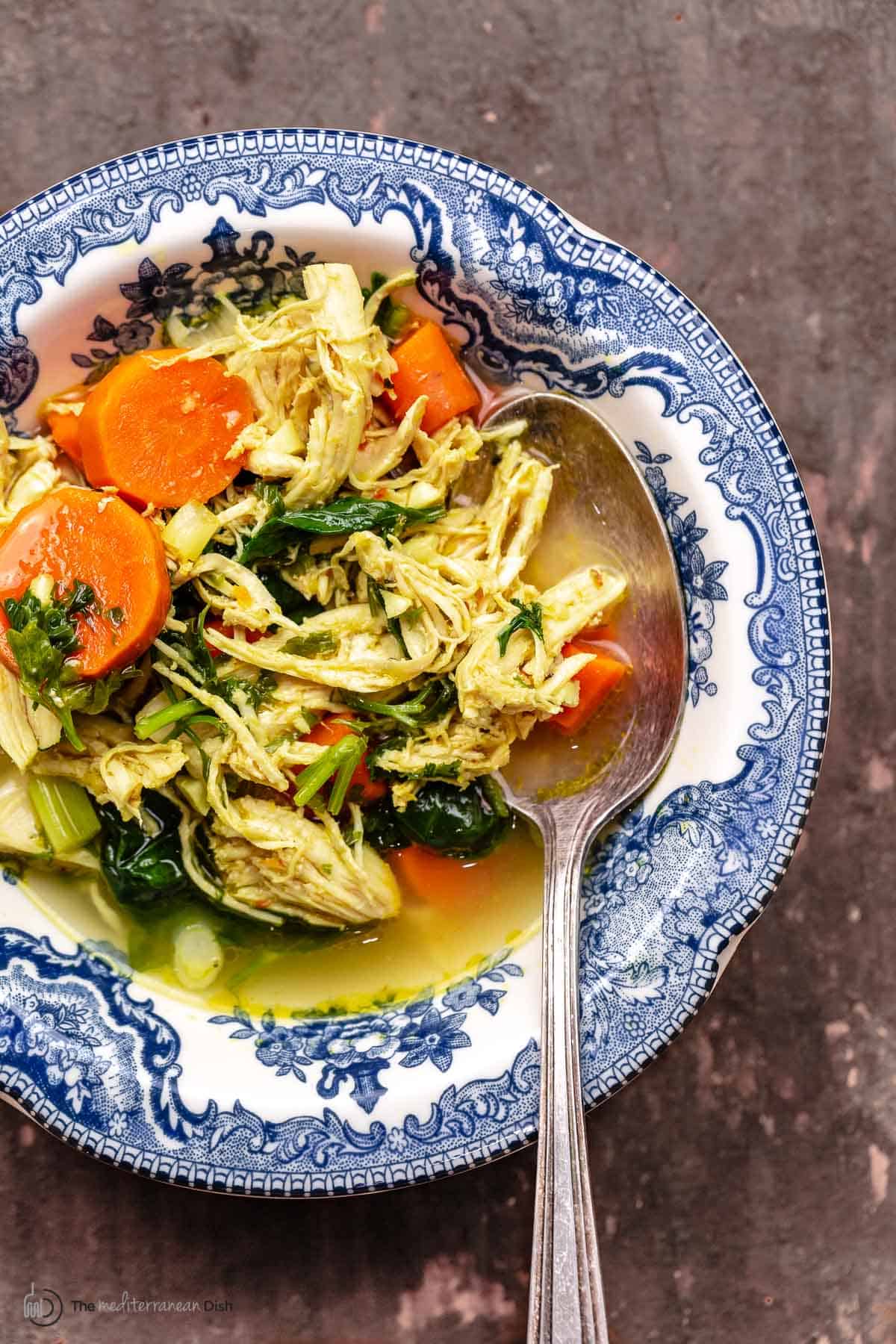
Vegetarian
- Garlic Parmesan White Beans – Add the “wow” factor to a can of humble white beans with fresh herbs, spices like Aleppo pepper, and some Parmesan cheese.
- Çılbır (Turkish Poached Eggs) – One of my favorite ways to eat eggs! They’re so easy to make, too.
- Sweet Potato Stew – This nutritious stew with carrots, spinach, and more gets an Eastern Mediterranean twist thanks to cumin, turmeric, and Aleppo pepper.
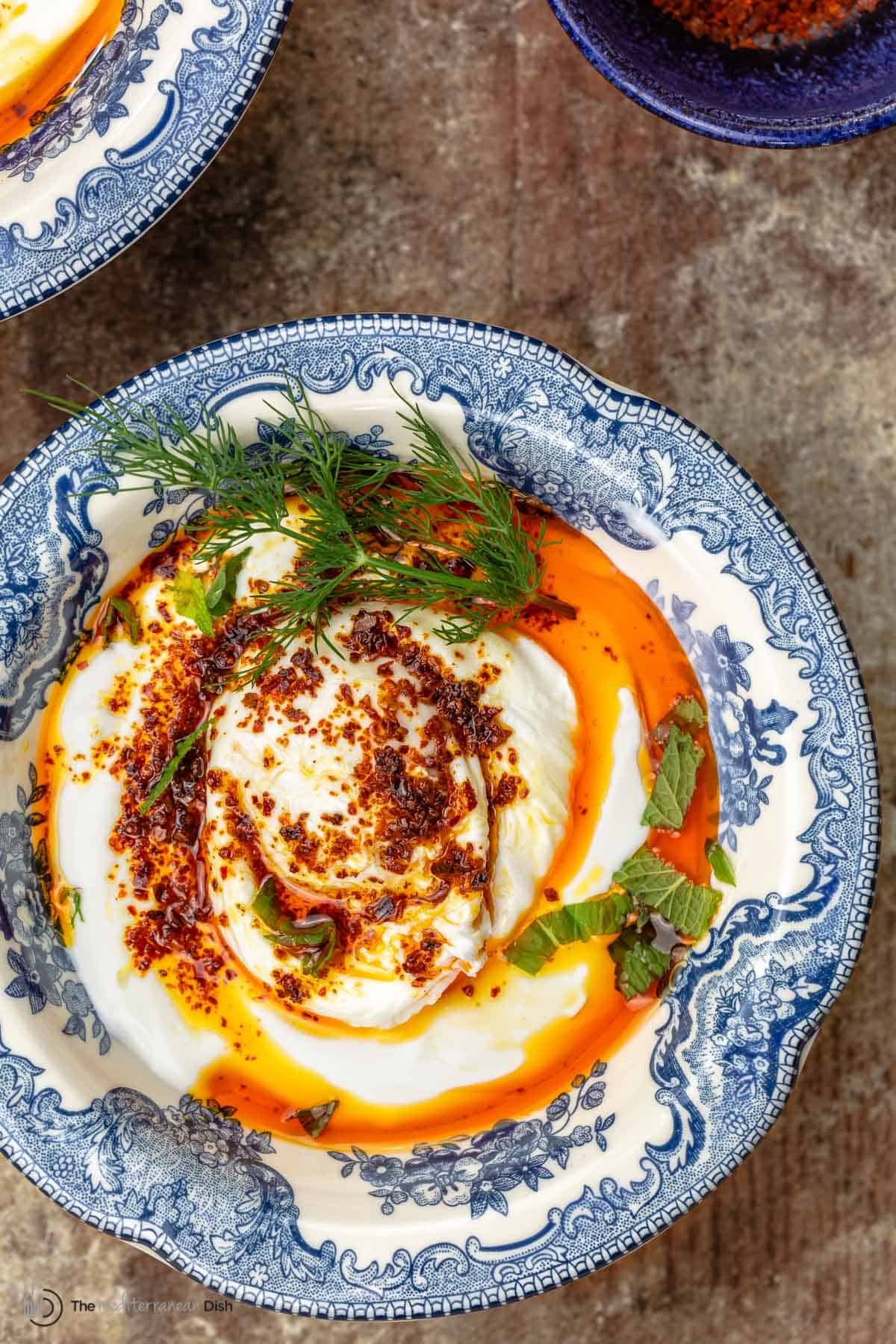
Fish
- Harissa-Lime Baked Salmon – Aleppo-style pepper works with harissa paste to add vivid color and warmth to this easy baked fish recipe.
- Sardine Salad – A good teaspoon or 2 goes into the salad dressing for color and tang.
- Pan-Seared Sea Bass – Warm spices amp up the flavor in this simple fish recipe.
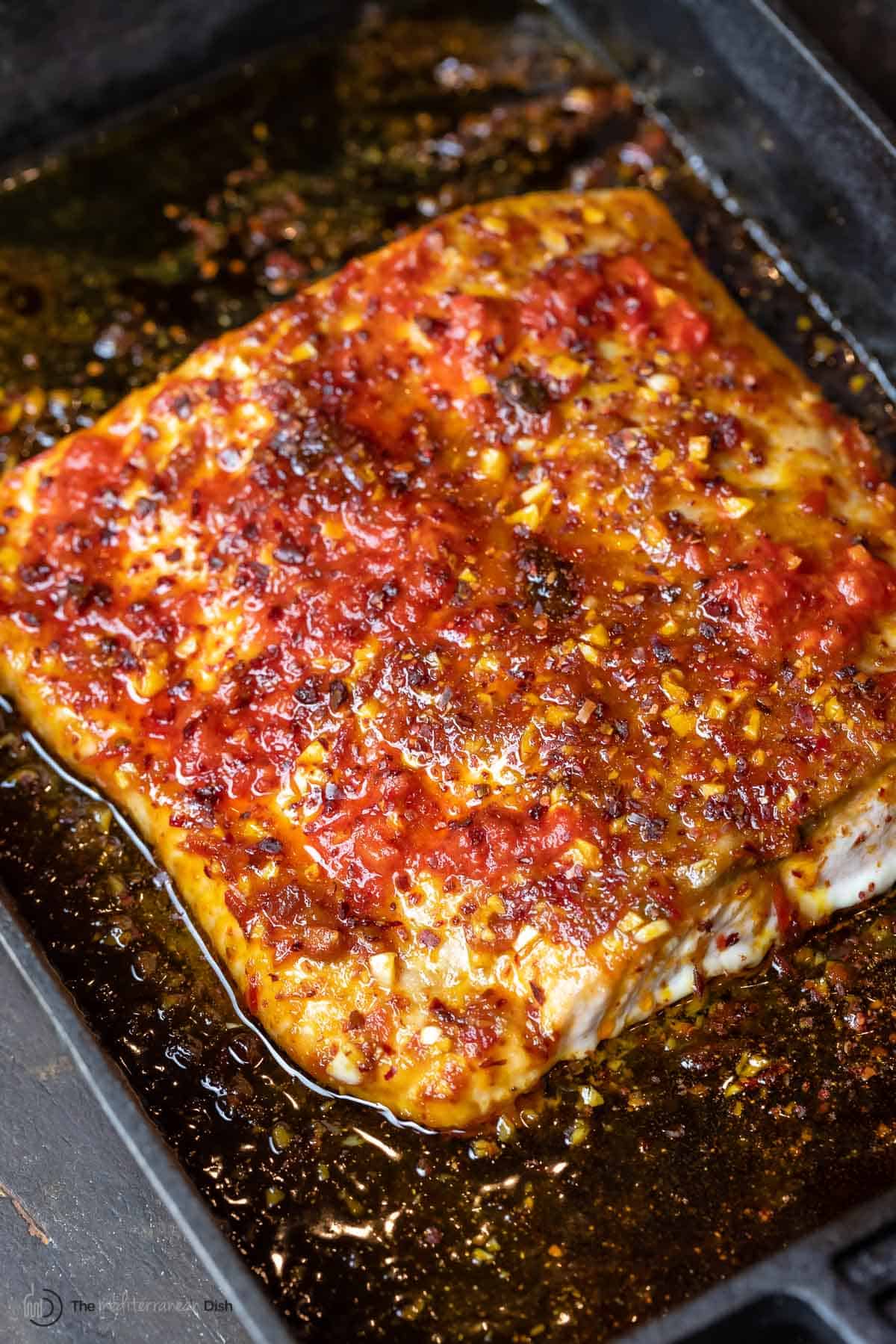
Dips and sauces
- Muhammara (Roasted Red Pepper Dip) – Aleppo pepper is a key ingredient in this savory, smoky, slightly spicy dip.
- Whipped Feta Dip – I love adding a generous dash of Aleppo pepper at the end to add vivid color and an extra kick of flavor.
- Baba Ganoush – Aleppo-style pepper flakes add a very subtle heat to this smoky eggplant dip.
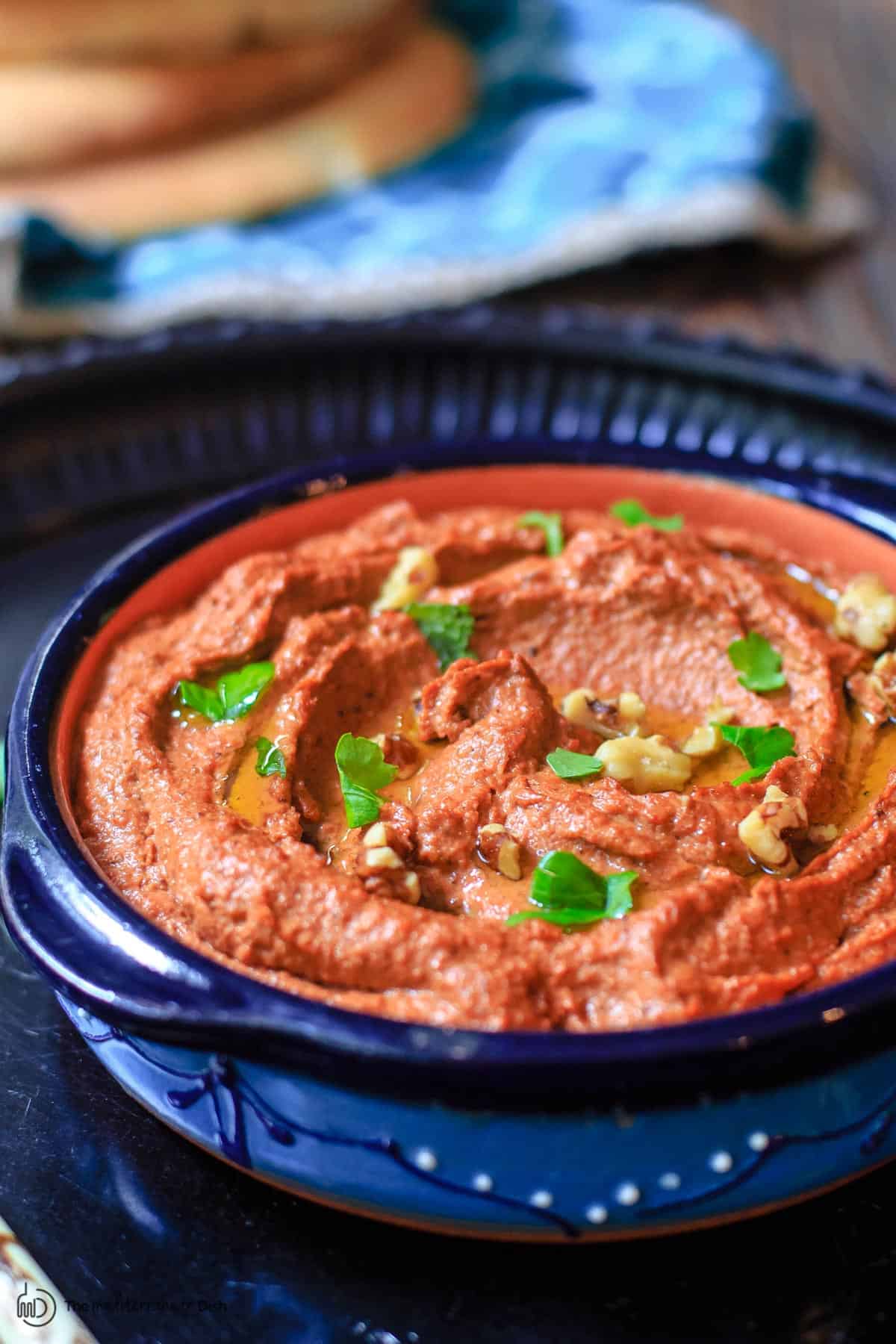
Aleppo pepper substitute
Because it is such a complex pepper, substituting it can be a little difficult. But if you must use something else, I have a couple of options.
For a DIY version, the best substitute for Aleppo pepper is a mixture of sweet paprika and cayenne pepper. Since Aleppo pepper has a mild heat, use about 4 times as much paprika as cayenne pepper. You can then add more cayenne if you need more of a kick.
I’ve also seen people use a mixture of red pepper flakes, cumin, and salt. This is a good option if you are looking for more earthy flavor and heat. Its Turkish cousin, Urfa biber, is another great substitute. You can read all about Urfa biber in our guide, and source it from our shop.
You could also try Marash or Antebi peppers instead, which are probably the closest substitutes. Both hail from Turkey, with Marash peppers carrying more heat and smokiness than Aleppo-style pepper, and Antebi being milder and fruitier. They aren’t widely available, though, and can be tricky to find.
Storage tips
Like other spices, when stored properly, Aleppo pepper can last for about 3 years! Store it in an airtight container away from light and heat – an unheated pantry is a fantastic option.
If you don’t use it very often, consider storing the crushed peppers in your freezer. This will extend its shelf life beyond 3 years.
You may also like
Visit Our Online Shop to find this spice and more quality Mediterranean ingredients!
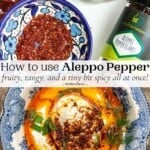
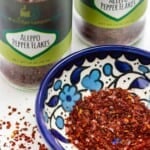
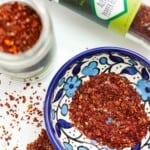
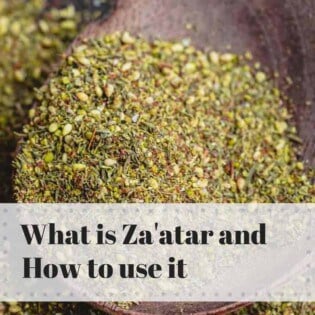
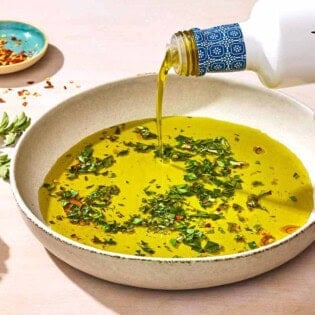
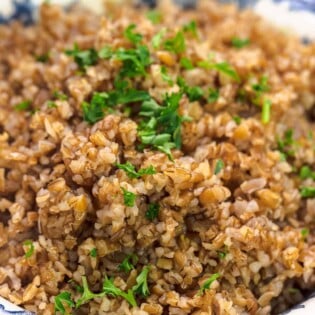
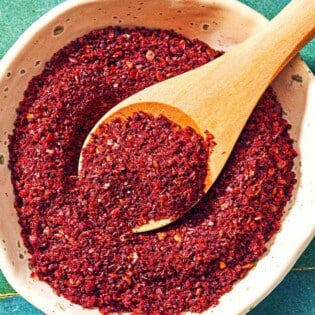
Thisseries was so helpful! Thank you for all the information.
I have always loved Aleppo pepper but wanted to know more about it and ways to best use it other than just sprinkling it on top of hummos
So many uses! So little time! 🙂
I love your Aleppo pepper… I’ve been looking for a “spicy” pepper that wasn’t to hot but just hot enough.. the sweet over tones make it unique … keeping in view I was weaned on Hungarian hot peppers. I purchased the Aleppo for one of your recipes (delicious by the way)… and now it’s my “go to” pepper. I use it on eggs, baked potato, salads… just about every thing… even popcorn.
This is so great to hear!! Thank you!
Suzie, you are a master chef extraordinaire! I love getting your emails. They are inspiring. Of the past week I am having trouble coping your recipes. I can copy other information from other websites, so I do not believe it is my printer. Have you change anything on your end? What I get are blank pages when I attempt to print a recipe. Any help would be greatly appreciated. Cheers, Marie Torget
Thanks for your kind words, Marie! Regarding printing issues, unfortunately, this usually does have something to do with your computer/printer settings or the web browser you are using (Chrome, Safari, DuckDuckGo, etc.), so there’s not really anything we can do to help. Some web browsers block pop ups which, for some reason, also blocks the pop up box for printing, which may be the problem. You might need to adjust your browser settings, or try a different browser on your end in order to print the recipes. I’m so sorry… I wish we could be of more help. If you have any other questions, just let us know.
Nice recipes for sure
How can I order your spices?.
Hi, Dianne. You can click here to access our shop. If you have any questions about anything feel free to reach out to our shop team at sales@themediterraneandish.com.
Is the Aleppo pepper you sell in your store gluten-free?
Hi, Amy! I’m Summer and I work here at The Mediterranean Dish. Yes, the Aleppo pepper we sell is gluten free.
I cannot find the price or where to buy it. Do you sell it direct?
We do! You can click here for the link to it in our shop.
I noticed aleppo pepper flakes, imported from Turkey, one marked Aleppo – Hot, the other Aleppo – Sweet. The store did not carry a ‘regular’ Aleppo pepper flakes. Do you know how the heat levels for the ‘hot’ and ‘sweet’ compare with the 10,000 scoville classification of common Aleppo pepper flakes?
Hi, Frank. We’re only familiar with one type of Aleppo pepper, and it’s moderately spicy… about a 6 on a scale of 1-10. Hope that helps a bit!
I love to follow your food blog. Awesome recipes. My family is in love with everything Mediterranean cuisine. And a plus, it’s healthy eating with lots of flavor.
Keep the recipes coming!
Rebecca
Will do! Thanks, Rebecca!
Great info! Thanks for sharing.
My pleasure, Ania!
This is the perfect spice for those of us who like a little kick, but don’t like things to be too hot. Love it!
So glad, Tara! Thank you!